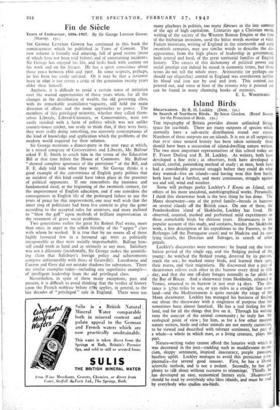Island Birds
Shearwaters. By R. M. Lockley.' (Dent. Iss.) In Search of Northern Birds. By Seton Gordon. (Royal Society for the Protection of Birds. 15s.)
THE topography of Britain provides almost unlimited living. space for sea-birds. There are many outposts' of species which normally have - a sub-arctic distribution round our coasts. Numbers of these outposts are on islands. It is not at all surprising that ever since natural history has been taken seriously there should have been a succession of island-dwelling nature writers. The two most important representatives of this school today are F. Fraser Darling and R. M. Lockley. As writers, both have developed a fine style ; as observers, both hare developed a critical, careful, painstaking method of study' as men, both have had a considerable personal struggle before they could do what they wanted—live on islands—and having won this first battle, both have had a further, and more continuous, struggle against sea and soil, wind and weather.
Some will perhaps prefer Lockley's I Know an Island, and others of his more anecdotal, autobiographical' works. Personally, I think this shearwater book is the best thing he,has done. The Manx shearwater—one of the petrel family—breeds in burrows on several islands off the British coast. On one of these, the Pembrokeshire island of Skokholm, Lockley. has lived. Be observed, counted, marked and performed mild experiments on these ,remarkable birds for thirteen years. Shiarwaters is his popular account of this study, and contains, besides the Skokholm work, a fine description of his expeditions to the Faeroes, to the" Berlengas (off the Portuguese coast) and to Madeira and its out- lying islands, the Desertas and Salvages, in search of other:' petrels.
Lockley's discoveries were numerous: he found out the incu-: bation period pf the single egg, and the fledging period of the young : he watched the fledged young, deserted by its parents, reach the sea ; he marked many birds, and learned their ages), their mates, and their migrations. He discovered that a pair of. shearwaters relieve each other in the burrow every third to fifth day, and that the one- o&duty forages normally as far afield as, the Bay of Biscay. And a shearwater from Skokholm, released at Venice, returned to its burrow in just over 14 days. The dis-. tance is 3,700 miles by sea, or 93o miles in a straight line over- land—and the Mediterranean is quite outside the range of the Manx shearwater. Lockley has managed his business of finding,' out about the shearwater with a singleness of purpose that has' sometimes been almost -fanatical. He-has a real feeling for the land, and for all the things that live on it. Through his writing runs the concept of the animal community ; he truly has 'the ecological point of view ; for him, as for a few other modern nature writers, birds and other animals are not merely_curiosities, to be viewed and described with tolerant sentiment, but part of a whole—a whole in which man, as a living creature, plays his - Part Nature-writing today cannot afford the luxuries with which it was decorated in the past—padding such as muddlesorne mysti- cism, sloppy sentiment, inspired inaccuracy, purple passages, baseless uplift. Lockley manages to avoid this pernicious para- phernalia—for several good reasons. First, he has a liberal scientific outlook, and is not a pedant. Secondly, he has got plenty, to talk about without recourse to trimmings. Thirdly he has developed an easy, economical literary style. 'Shea/water' "should be read by everybody who likes islands, and Must be read by everybody who studies sea-birds. . Mr. Seton Gordon's reputation as an ornithologist and writer will contmend his In Search of Northern Birds to a wide public. The book gives an account of bird-watching expeditions in Ice- land, the Hebrides, Shetland, Ireland and Wales, and will appeal to those who like birds, but have no particularly critical approach to their study. It will appeal, too, to some of us who, just now, must have a certain nostalgia for wild places. I cannot imagine that Mr. Gordon intended the book to take a more serious place in bird-literature ; if he had, it would be necessary for me to weary readers with a catalogue of some inaccuracies and half- truths. There are plenty of colourful passages. describing scenery, with a suitable leaven of Gaelic place-names.
JAMES FISHER.































 Previous page
Previous page